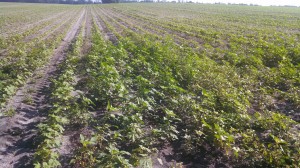The first glyphosate tolerant Palmer amaranth (PA) populations were found in Georgia in 2005. This area of North Florida has largely escaped from development of these populations over the past decade. In this area; except for glyphosate resistant corn which is nearly always sprayed with multiple modes of action to control broadleaf weeds, there was little use of glyphosate outside of spring burn down applications. Our area has seen little soybean and cotton production over the past decade, and thus little reliance on Roundup Ready technology. Conversely, farmers in Georgia relied heavily on the use of glyphosate to control broadleaf weeds in both cotton and soybeans. The populations of glyphosate tolerant PA ballooned rapidly under an intensive cotton production system in Georgia and the entire Southeast.
Farmers in this area planted very little cotton until two years ago. Thus we haven’t seen the selection pressure experienced further north until recently. The title of my post, “Winning the Battle….But, Losing the war” is a reference to our small victories every time we spray glyphosate over cotton hoping to kill PA. In general we are winning the skirmishes over most of the weed clusters sprayed. However, the occasional cluster of weeds can be found where the combination of Glyphosate + Staple was completely ineffective. I’m discouraged that area farmers are too complacent about making better chemical decisions on the front side, and are not hand weeding as necessary to clean up these resistant populations. In the absence of hand weeding, we will be sending millions of seeds through the combines or pickers and “planting the seeds” of a much more challenging future in farming in this area. The repercussions of complacency will be felt by future tenants, and even future generations. Unfortunately, I don’t believe we will develop a zero tolerance policy for this threatening weed until it is too late. I’m sure many of our neighbors to the north and west will quiver as they reminisce the mistakes made in the past, and the ultimate costs of those mistakes on their operations.


saw some clean cotton as I traveled into Georgia today, amazed at no palmer fields….then I saw ‘the van’ parked under a tree near an infested field….crew of 12 walking and pulling palmer….my confidence that the farmers up there had figured out how to control it shattered…happy 4th to all.